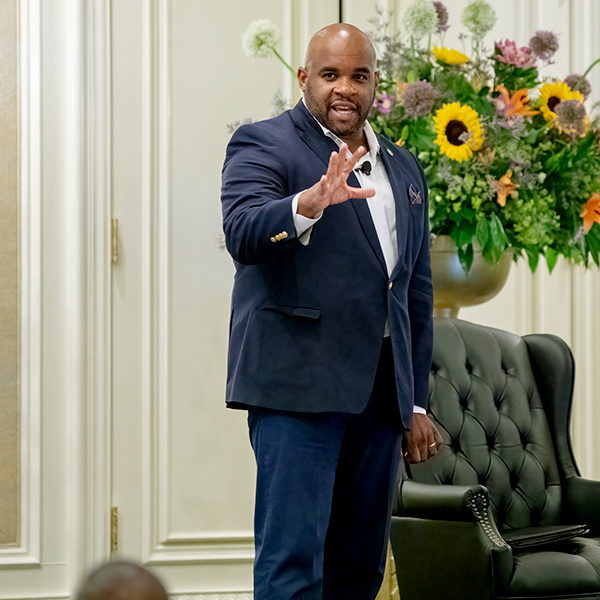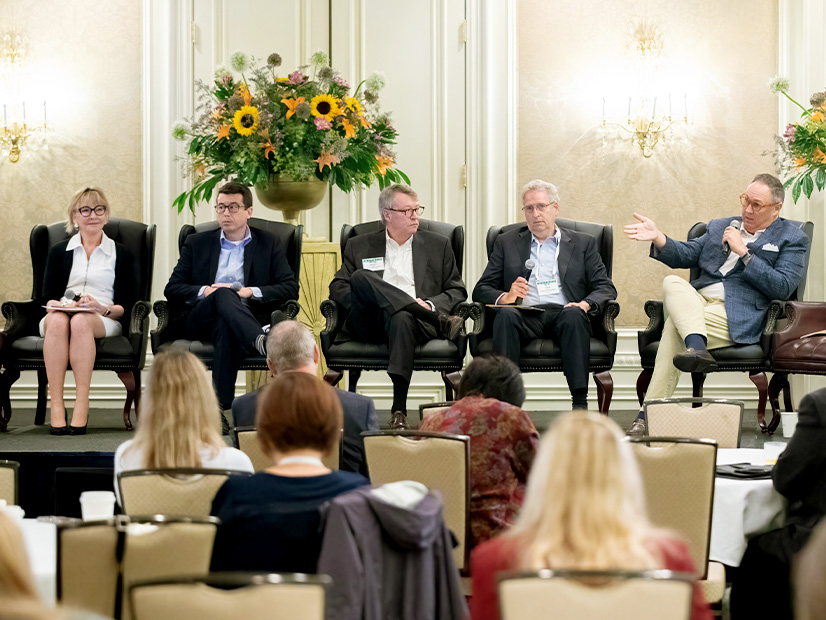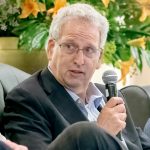
FARMINGTON, Pa. — Several sitting and former FERC commissioners shared their views on the future of RTOs and the relationship between state and federal regulators during the Mid-Atlantic Conference of Regulatory Utilities Commissioners (MACRUC) annual educational conference last week.
Speaking during the opening sessions of the conference June 26, acting FERC Chair Willie Phillips said cyber and physical security, the changing resource mix, extreme weather risk and the challenge of building the transmission necessary for the clean energy transition are some of the most critical issues the states and commission are likely to face in coming years.
Former Commissioners Suedeen Kelly, Philip Moeller, Robert Powelson and Richard Glick, the last of whom served as chair until January, sat on a June 28 panel discussing how communication between state and federal regulators can be improved. That forum was moderated by Maryland Public Service Commission Chair Jason Stanek, a former FERC senior staffer.
Both panels were asked how FERC should respond if it concludes that state policies are jeopardizing reliability by causing resources to retire without adequate replacement capacity. Glen Thomas, president of the PJM Power Providers group, asked Wednesday’s panel if the commission would take action in such a scenario.
“In this situation where you have a state policy that is causing pretty significant impacts in other states, is there a role for FERC here? Is this a situation where FERC just shrugs its shoulders and says, ‘Well it’s a state; it gets to do what it wants to?’ Or is this a situation where FERC recognizes the interstate impacts of a state’s action and can do some things to balance the equity?” he asked.
Kelly said the grid requires resources that are dispatchable, a characteristic that renewables largely lack. Until enough utility-scale storage can be developed, she said, thermal resources will have to be retained to maintain reliability.
“If you aren’t at the point where we can dispatch all of our renewables, we need our tried-and-true dispatchable generators, including gas-fired. As much as the community may not want carbon emissions, I think it’s important to educate the community that you can’t have 100% green without storage and in the meantime, we need other ways to ensure our renewables are dispatchable,” she said.
Glick said FERC’s ability to delay retirements is limited and the industry may need to find out-of-market solutions to ensure enough capacity remains available.
“You do have to have market reform, but I also think you have to engage — and I think you’re seeing it more increasingly frequently — you have to have out-of-market solutions to keep plants around, to take other actions to keep the lights on while the [development of] transmission’s underway, [and] while battery storage technology comes into play,” he said.
Powelson said shutting down units could have a cascading effect that impacts other states and requires increased use of reliability-must-run (RMR) contracts.
“We’re all in this together, and my concern is we move too fast and we start having these out-of-market RMR contracts, and that’s not good for consumers; that’s not good for the long-term future of grid reliability,” he said.
When asked about the future of coal plants, Phillips said they will likely continue to play a role for at least the next five years. Gas-fired resources will likely continue operating years past that, while coal units will see economic pressure to deactivate.
Speaking on Monday, Phillips said streamlining the path for building new transmission could provide the “biggest bang for the buck” in getting new generation on the grid. Much of the nation’s infrastructure is over 50 years old and will soon need replacement. He said it may be necessary for RTOs and regulators to begin using a 20-year planning horizon and to explore regional planning. The commission may also explore interregional transfers, he said, pointing to the benefits the capability provided during the February 2021 winter storm.
Also, many projects are designed with a single purpose and don’t consider additional benefits that could be realized.
“We do have projects that sit in silos. They’re siloed because of reliability, they’re siloed because of economics or jobs; what I would like to see are more multivalue projects,” he said.
Fixing Cost Allocation
One of the challenges Phillips anticipates is how to address cost allocation, which he said the commission will likely be addressing in the near future.
On Wednesday, Glick said interstate transmission projects can be difficult to plan when the cost allocations and benefits for each state do not match. While Congress is discussing providing FERC with preemptive siting authority on some lines, he said buy-in from the states will lead to a better outcome.
“The current approach to siting — obviously it can be problematic because there are some cases where some states may not have as much of an incentive to site a line if they feel it’s going to benefit another state, but they’re going to have to pay a significant share of the cost. So fixing the cost allocation problem is a big part of it,” he said.
Kelly said the commission has seen growing opposition to projects, including a convergence across the political spectrum as conservative landowners and liberal environmentalists turn to FERC to push against developments. She said developers of projects such as the West of Devers line in California or Western Spirit in New Mexico were able to build transmission to clean energy by engaging in dialogue with local communities.
“Both of those have been characterized by intense working with the community to try and understand what the communities’ opposition or problem with it is and accommodate it,” Kelly said. “Oftentimes that accommodation comes not just in changing the siting, which is oftentimes what we did at FERC when we were talking about natural gas pipelines, but in spending the money necessary to take care of some of the concerns in communities that were going to be impacted.”
“One thing that we should think about as regulators — state and federal regulators — is can we be a force to further the discussions of transmission developers with the communities and maybe be part of that and facilitate that,” she said.
FERC and EJ
Following the commission’s roundtable on environmental justice last month, Phillips and Glick both spoke about the importance of listening to communities’ concerns and ensuring that the benefits of the clean energy transition are felt by all.
Phillips said it’s a personal priority of his, being from Alabama where he grew up in the shadow of heavy industry. He said FERC has streamlined the permitting process to create a legal obligation for communities to be given a voice. Not enough of the public is participating in hearings, he said, but the commission’s Office of External Affairs is working on improving its consultation process.
Glick recounted visits he made to Port Arthur, Texas, and Lake Charles, La., to view the impact polluting industry has had on residents there. While those aren’t FERC-regulated industries, he said it showed the potential consequences when environmental justice isn’t considered.
Hearing from residents and putting conditions on FERC orders to address communities’ concerns during the FERC process can also avoid legal challenges to its decisions and help get projects built easier, Glick said.





